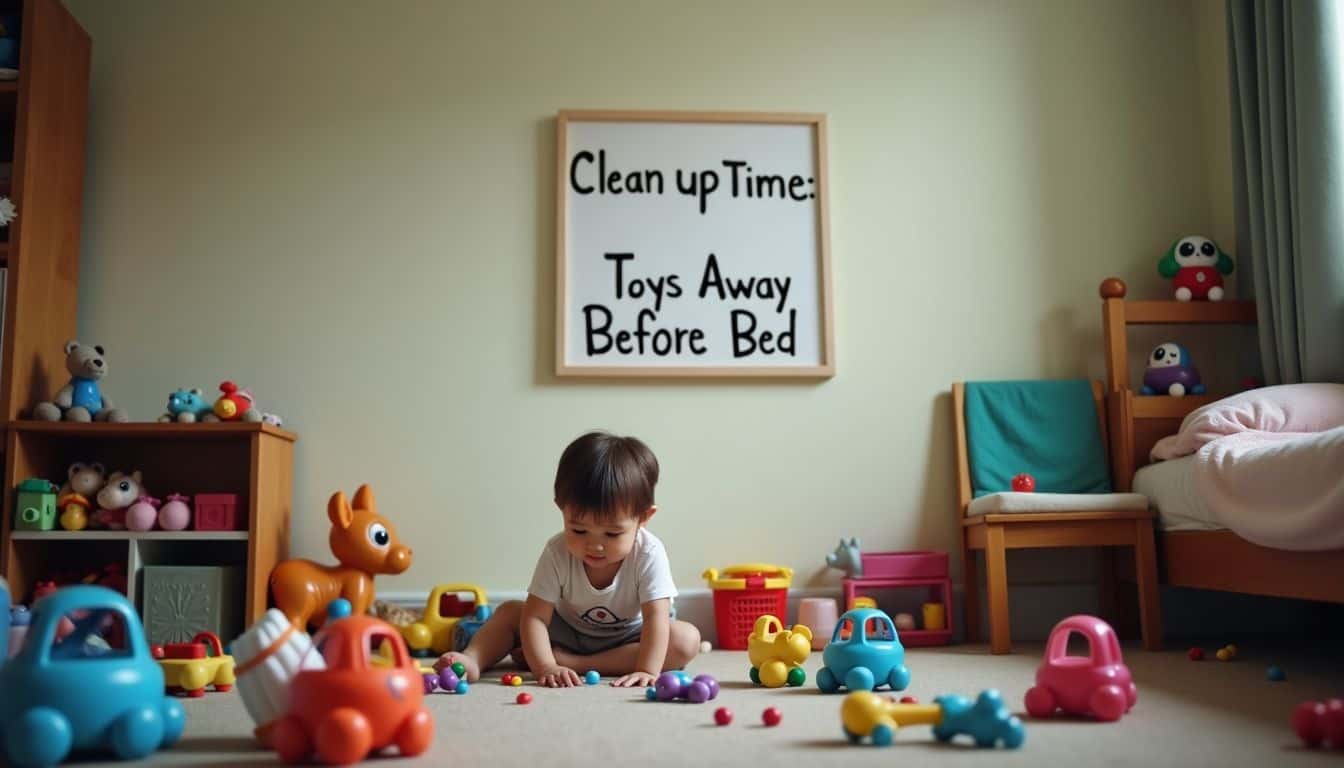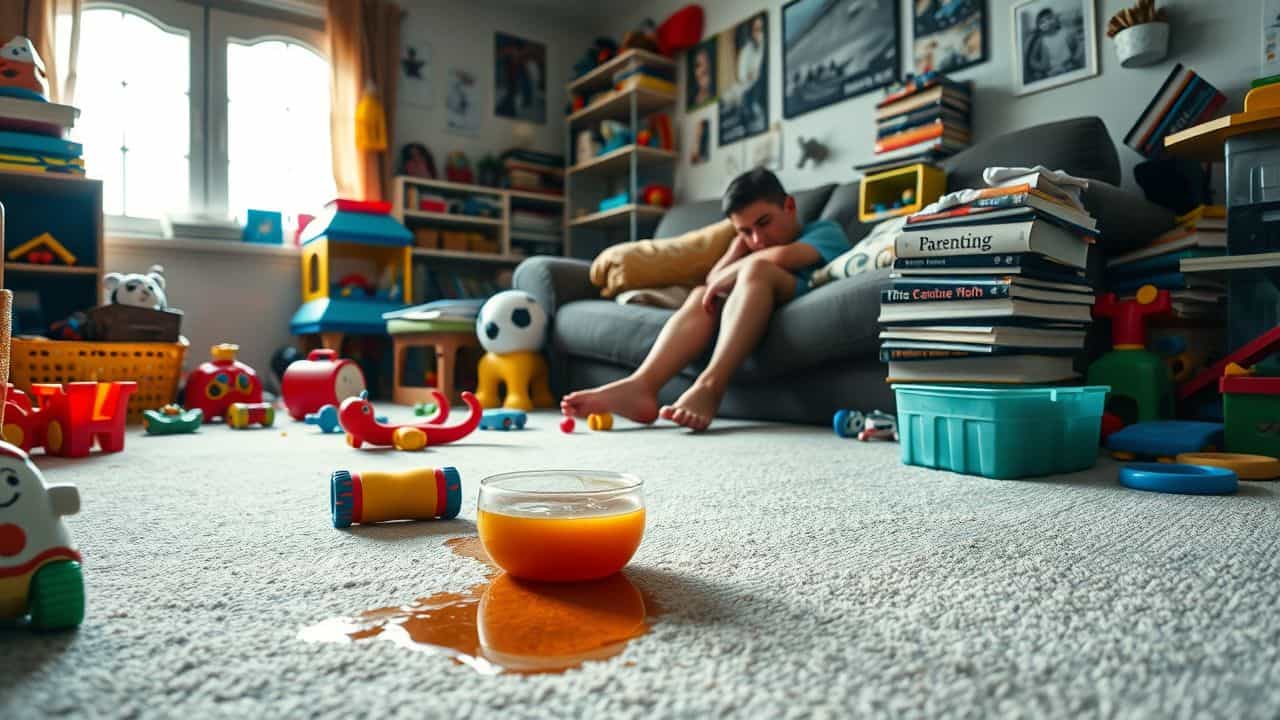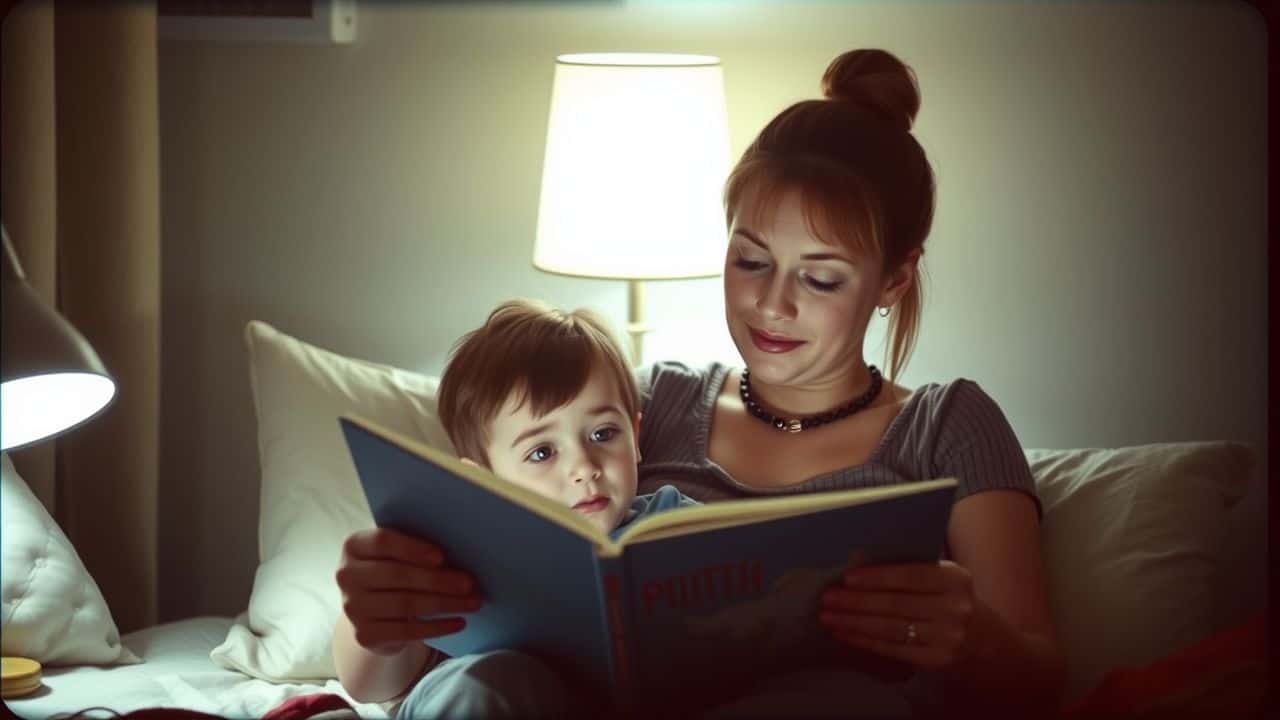Being a good mom can feel tough in today’s fast-paced world. Many moms worry if they’re doing enough for their kids. There’s no one-size-fits-all approach to motherhood. This guide offers 15 heartfelt ways to help you master modern motherhood.
Ready to boost your mom skills?
Key Takeaways
Listen closely to your kids and respect their unique traits to build a strong bond.
Create a nurturing home with clear rules, unconditional love, and support for your child’s interests.
Take care of your own health and find a support network to be a better mom.
Show love through words and actions daily to strengthen family ties.
Accept that you’ll make mistakes, learn from them, and be flexible as your kids grow and change.
Table of Contents
Knowing Your Child

Knowing your child is key to being a great mom. It’s about seeing your kid as a whole person, not just your little one.
Listen to Their Needs

Moms, your kids need you to listen. Really listen. Put down your phone and give them your full attention. Look them in the eye when they talk. Nod and smile to show you care. Ask questions about their day.
This makes them feel important and loved. Kids who feel heard do better in school and have less worry.
I learned this the hard way. My son used to act out at bedtime. I thought he was being difficult. Then I sat down and truly listened. He was scared of the dark! We got a nightlight, and bedtime became easy.
Now, I always try to hear what’s behind my kids’ words. It’s amazing what you learn when you open your ears and heart. As they say, “they grow up so fast,” so cherish every chat.
Listening is a magnetic and strange thing, a creative force. – Karl A. Menninger
Respect Their Unique Traits

Kids are like snowflakes – no two are alike. Your child has their own special mix of traits that make them who they are. Some kids love to talk, while others are quiet thinkers. Some jump into new things, and others need time to warm up.
As a mom, it’s key to spot and cheer on these special qualities. This helps your child grow into their best self.
Loving your child’s unique traits doesn’t mean you let them do whatever they want. It means you guide them based on who they are. For example, if your kid is shy, don’t force them to be the life of the party.
Instead, help them find ways to shine that feel right for them. This builds their self-esteem and shows them you’re in their corner. Next, let’s look at how to create a nurturing home for your one-of-a-kind child.
Recognize Their Feelings

Kids have big feelings. As moms, we must tune in to their emotions. This means watching their faces and body language. It also means listening to their words and tone. When we do this, we show our kids we care.
We help them feel safe and understood.
Feelings matter a lot. Happy, sad, mad, or scared – they’re all okay. Let your child know it’s fine to feel. Don’t judge or brush off their emotions. Instead, name the feeling and show you get it.
This helps kids learn about their own hearts. It also makes your bond stronger. Before you know it, your stepdaughter will have grown up.
So, make the most of these moments. Next, let’s look at how to create a loving home.
Creating a Nurturing Home

Home is where the heart is, and moms play a big role in making it warm. A nurturing home gives kids a safe place to grow and learn. It’s a space where love flows freely and rules are clear.
Offer Unconditional Love

Moms, your love is a superpower. It builds your child’s confidence and makes them feel safe. Show your love every day, not just when they’re good. Hug them, tell them you care, and be there when they need you.
This doesn’t mean you let them do whatever they want. It means you love them no matter what.
I learned this the hard way with my own kids. At first, I thought love meant giving in to their every wish. But that’s not it at all. True love is about being there, listening, and supporting them even when they mess up.
It’s about helping them grow into strong, kind people. As you show this love, you’ll see your bond grow stronger. Now, let’s talk about how to set clear rules at home.
A mother’s love is the fuel that enables a normal human being to do the impossible. – Marion C. Garretty
Establish Clear Rules

Offering unconditional love creates a foundation for a happy home. Yet, love alone isn’t sufficient. Clear rules help kids feel safe and understand expectations. As a mom, I’ve discovered that setting firm limits is essential to a peaceful house.
Kids thrive on structure. They need to understand what’s acceptable and what’s not. Establish a few key rules and maintain them consistently. For example, “We use kind words” or “Bedtime is at 8 PM.” Keep rules simple and easy to follow.
When kids break rules, implement fair consequences. This teaches them responsibility. Some parents are concerned about being too strict. But clear rules actually help kids feel secure.
They understand expectations and can relax. Just remember, rules are most effective when combined with plenty of love and praise for good behavior.
Support Their Interests

Kids thrive when we back their passions. Show your child you care by getting excited about their hobbies. Ask questions and listen as they talk about what they love. Maybe your son is into bugs or your daughter loves to paint.
Whatever it is, make time to explore it together. Buy books on the topic or find local events that match their interests.
Your support can spark lifelong pursuits. It builds your child’s confidence and helps them find their place in the world. Plus, it’s a great way to bond and make memories. Next, let’s look at how skilled parenting practices can strengthen your relationship with your child.
Practices for Skilled Parenting

Skilled parenting takes practice and patience. Want to learn more about raising happy, healthy kids? Keep reading!
Enjoy Time Together
Moms, let’s talk about fun! Spending time with your kids isn’t just good for them—it’s great for you too. Play a board game, go for a walk, or bake cookies together. These simple acts create lasting memories.
They also help you bond with your child in a special way.
Quality time doesn’t have to be fancy. It’s about being present and engaged. Put away your phone and really listen to your child. Laugh at their jokes, even the silly ones. Share stories from your own childhood.
These moments of connection are priceless. They build trust and love between you and your little one.
The best thing you can give children, next to good habits, are good memories. – Sydney Harris
Share Responsibilities
After enjoying time with your kids, it’s vital to share duties at home. Moms can’t do it all alone. Splitting tasks with your partner or family members makes life easier. It shows kids the value of teamwork, too.
Give each person a job they can handle. Even young kids can help out. My son loves to feed the dog, while my daughter sets the table. This teaches them skills and makes them feel important.
Plus, it frees up time for you to relax or focus on other things. Don’t be afraid to ask for help when you need it. A happy mom often leads to a happy home.
Implement Consistent Discipline
Sharing responsibilities sets the stage for a well-run home. Now, let’s talk about keeping order through fair rules. Consistent discipline helps kids know what to expect. It’s not about harsh punishments.
Instead, it’s about clear limits and follow-through. Studies show that moms who use gentle guidance have better bonds with their kids. This approach works better than strict or unpredictable methods.
I learned this the hard way with my own kids. At first, I’d let things slide, then get mad later. It confused them and stressed me out. Now, we have clear rules and consequences. For example, no diaper punishment or time-outs that last too long.
We stick to our plan, even when it’s hard. It’s made our home calmer and happier. The key is to stay firm but kind, no matter what mood you’re in. This helps kids feel safe and builds trust between you.
Prioritizing Mom’s Well-being

Moms need to take care of themselves too. A happy mom makes for a happy family.
Focus on Your Health
Moms often put their kids first, but your health matters too. Taking care of yourself isn’t selfish – it’s smart. The THRIVE program helps moms focus on their well-being. It teaches ways to cut stress, spark your brain, and keep up friendships.
These steps make you a better mom and person.
I learned this the hard way. For years, I ignored my own needs. I felt drained and cranky. Then I started small – a quick walk, a chat with a friend, or five minutes of quiet time.
It made a big difference. Now I have more energy for my kids. Plus, I’m teaching them to value self-care, too.
Self-care is giving the world the best of you, instead of what’s left of you. – Katie Reed
Manage Work and Home Life
A healthy mom can better manage work and home responsibilities. Now, we’ll discuss balancing these two areas. Moms often feel pulled in many directions. Work demands time and energy.
Home life needs attention too. The key is to find a mix that works for you.
Set clear boundaries between work and home time. Use a planner to organize your day. Make time for both roles. Ask for help when you need it. Your partner, family, or friends may pitch in.
Good childcare is vital for working moms. Consider daycare or hiring a nanny. You can’t do it all alone. It’s okay to say no to extra tasks. Focus on what matters most to you and your family.
With some planning, you can excel in both roles.
Find Support Networks
After balancing work and home, moms need a strong support system. Connecting with people who understand you can make a significant difference. Local parenting groups offer an excellent way to meet other moms.
You’ll share experiences and learn new tips. These groups can be invaluable when you feel overwhelmed or isolated.
Online forums and social media groups also provide support. They allow you to reach out any time, day or night. You can ask questions, express your feelings, or just chat with other moms.
It’s important to recognize that asking for help is acceptable. Your mental health is crucial too. Joining a support network can improve your mood and help you feel more connected in your parenting experience.
Strengthening Family Bonds

Family bonds grow stronger with open talks and lots of love. Show your care through kind words and good deeds every day.
Communicate Clearly
Clear communication forms the foundation of strong family ties. Moms can encourage open talks by creating a safe space for kids to share. This means listening without judgment and showing genuine interest in their thoughts.
Use simple words and ask questions to make sure you understand. Body language matters too. Make eye contact and nod to show you’re tuned in.
Good communication goes both ways. Express your own feelings and needs clearly to your children. Use “I” statements to avoid blame. For example, say “I feel worried when you’re late” instead of “You always make me worry.” This approach helps kids learn to express themselves better, too.
Your calm demeanor during tough talks teaches kids how to handle tricky chats.
Express Love Frequently
Moms, let’s talk about showing love often. It’s easy to get caught up in daily tasks and forget to say “I love you.” But those three words pack a punch. They make kids feel safe and valued.
Try to say them every day, even when you’re busy or tired. Actions speak louder than words, too. A hug, a kiss, or a pat on the back can mean the world to your child.
Love isn’t just about big gestures. Small acts count too. Leave a sweet note in your kid’s lunchbox. Send a funny text during the day. Smile when they walk in the room. These little things add up and create a loving home.
Kids thrive when they feel loved and supported. Your love helps them grow into happy, healthy adults. Next, let’s explore how to show love through your actions.
Demonstrate Positive Actions
Kids learn best by watching their parents. As moms, we can show our children how to be kind and caring through our own actions. I’ve found that simple acts like helping a neighbor or saying “thank you” to a cashier make a big impact.
These small gestures teach our kids to be thoughtful and respectful.
Our actions speak louder than words. When we stay calm during tough times, our kids learn to handle stress better. If we admit our mistakes and say sorry, they learn it’s okay to be wrong sometimes.
By living out good values daily, we give our children a strong foundation for life. This positive modeling shapes their attitudes and helps them grow into caring adults.
Overcoming Parenting Obstacles

Parenting throws curveballs, but you’ve got this! Learn how to bounce back from mistakes and roll with the punches. Want to become a parenting pro? Keep reading for more tips on mastering modern motherhood.
Accept Imperfections
Moms, let’s face it: we’re not perfect. And that’s okay! Trying to be the “perfect mom” is like chasing a unicorn. It’s not real, and it’ll drive you nuts. Instead, embrace your flaws.
They make you human and teach your kids valuable lessons. Your little ones learn from watching you handle mistakes with grace.
I’ve learned this the hard way. Once, I burned dinner and felt like a failure. But my kids and I ended up having a blast making PB&J sandwiches together. They saw me laugh it off and move on.
That night taught them more about resilience than any lecture could. So cut yourself some slack. Your kids don’t need a perfect mom. They need a real one who loves them, warts and all.
Learn from Errors
Moms make mistakes. It’s part of the job. But these slip-ups can be gold mines for growth. They teach us to be kinder to ourselves and show our kids how to bounce back. When you goof up, take a deep breath.
Look at what went wrong and why. Maybe you caught them smoking and lost your cool. Next time, you’ll know to stay calm and talk it out.
Each error is a chance to get better at this mom gig.
Turning boo-boos into lessons builds grit. It helps you solve problems better, too. Your kids are watching, so show them it’s okay to mess up. Laugh it off when you burn dinner. Say sorry if you yell for no reason.
This teaches them to be nice to themselves when they stumble. It’s all part of growing into a strong, loving family. Now, let’s talk about how to roll with the punches when life throws curveballs your way.
Adjust to New Situations
Life presents unexpected challenges, and moms must learn to handle them skillfully. Kids grow, routines change, and new challenges arise. Being flexible helps you manage these shifts with grace.
I’ve found that staying open-minded makes a big difference. It allows me to adapt my parenting style as my kids’ needs evolve.
Embracing change doesn’t mean you have to like it. It’s okay to feel unsure or even scared. The key is to face new situations head-on. Try new approaches, ask for help when needed, and keep a positive outlook.
Every mom faces these hurdles. You’re not alone in this journey of constant adjustment. By staying adaptable, you’ll set a great example for your kids on how to handle life’s unexpected events.
People Also Ask
How can I show empathy to my kids?
Listen closely to your little ones. Watch their body language. Pay attention to their feelings, not just their words. This helps you connect better and understand their world.
What’s the best way to handle sibling fights?
Stay calm and be fair. Teach them to talk it out. Help them see each other’s side. Use positive discipline to guide them. This builds empathy and teaches problem-solving.
How do I balance the needs of kids with different personalities?
Give each child one-on-one time. Understand their unique traits. Some may be outgoing, others quiet. Some might have ADHD or learning challenges. Tailor your approach to fit each child’s needs.
What if I lose my cool and yell at my kids?
It happens to all of us. Take a deep breath. Apologize sincerely. Use it as a chance to teach about feelings and forgiveness. Show them it’s okay to make mistakes and learn from them.
How can I take care of myself while being a good mom?
Self-care isn’t selfish. It’s vital. Find ways to recharge. Maybe it’s a hobby, exercise, or chatting with friends. If you’re struggling, don’t hesitate to talk to a therapist. Your wellness matters too.
How do I instill good values in my children?
Be the example you want them to follow. Show kindness, curiosity, and humor. Talk about important things like honesty and respect. Create family traditions that reflect your values. Remember, actions speak louder than words.
References
https://momonpurpose.com/15-simple-ways-to-be-a-better-mom/ (2024-06-17)
https://pmc.ncbi.nlm.nih.gov/articles/PMC2730447/
https://www.wikihow.com/Be-a-Good-Mother
https://joyfullifemagazine.com/enjoying-motherhood/
https://www.motherhoodcenter.com/balancing-motherhood-and-work/ (2023-08-17)
https://www.ncbi.nlm.nih.gov/pmc/articles/PMC3582366/
https://deeplyrootedwellness.com/2022/11/23/mom-prioritize-your-wellbeing/ (2022-11-23)
https://greatergood.berkeley.edu/article/item/what_kind_of_support_do_moms_need (2023-05-10)
https://thesavvymama.com/how-to-be-a-good-mother/
https://raisingslow.com/the-good-enough-mother/
https://www.linkedin.com/pulse/embracing-imperfection-reality-motherhood-raya-halet-dclhf
https://www.talkspace.com/blog/challenges-of-motherhood/ (2024-08-26)
